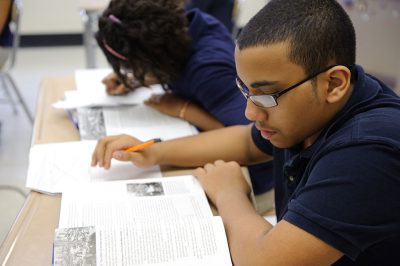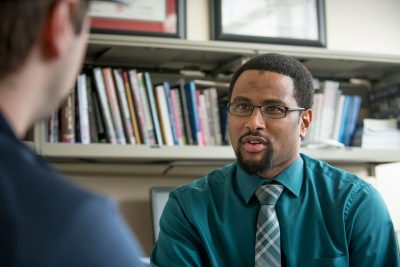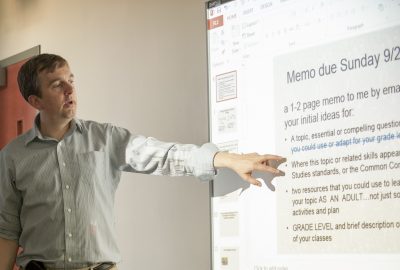NPR (Neag School professors and a student weigh in on arming school staff in response to the school shootings)
The Continued Success of UConn’s Baseball Coach Jim Penders
Fox61 (Jim Penders, UConn baseball coach and Neag School alumnus, is profiled)
Let’s Change the Way We Think About Creativity in Marketing
The Content Standard (Neag School professors, James Kaufman and Ronald Beghetto, are quoted on creativity)
Students in Poverty Less Likely to Be Identified as Gifted

Editor’s Note: The following piece was originally published on UConn Today. Access the original story here.
UConn gifted education specialists have published the first study to demonstrate a link between student poverty, institutional poverty, and the lower identification rate of gifted low-income students.
The study, “Disentangling the Roles of Institutional and Individual Poverty in the Identification of Gifted Students,” was published in the journal Gifted Child Quarterly. Researchers found that students eligible for free or reduced lunch programs are less likely to be identified for gifted education services even after controlling for prior math and reading achievement scores. In addition, the findings indicated that students in low-income schools have a further reduced possibility of being identified for gifted services.
“This is the first look at this issue in a significant way,” says Rashea Hamilton, a research associate in the National Center for Research on Gifted Education (NCRGE), part of UConn’s Neag School of Education. “We were able to make connections between higher proportions of free or reduced lunch students and availability of gifted programs and percentage of gifted students.”
“There should be a certain percentage of students at each school who are identified as gifted, because no matter how low-achieving your school is, there are going to be children in that school that need more academic challenge.”
— D. Betsy McCoach, Professor
The study reviewed data of 330,531 students in three unidentified states who entered third grade in 2011 and finished fifth grade in 2014, the grade levels where standardized testing typically begins and initial identification of gifted students often occurs. Students in the sample attended 4,546 schools covering 367 school districts in three states with mandates for gifted education.
The study found that poverty measured by the percentage of students in free or reduced lunch programs related to the school’s gifted identification rate. In two of the three states evaluated in the study, the percentage of students in the lunch program negatively predicted the proportion of gifted students in the school, even after controlling for school and district reading and math achievement.
In the third state, although a school’s percentage of free or reduced lunch student population did not predict the percentage of gifted students after controlling for school reading and math achievement, the proportion of students in the lunch program throughout a district did predict a lower proportion of gifted students in the school. “These findings suggest that both institutional poverty and individual poverty help to explain elements of underrepresentation of students in programs for the gifted,” the researchers wrote.
“The implications of this research are clear: Students who live in poverty are likely to be overlooked during the gifted identification process,” the researchers said. “Furthermore, within-district inequities appear to contribute to the under-identification of students of poverty as gifted. High-potential students in poverty are less likely to be recognized and served in programs for the gifted. Such practices have the potential to increase, rather than decrease, social inequities.”
“Even within the same district, we were noticing the percentages of gifted students were very different across schools within the district, and the percent of free lunch students were different across schools within a district,” says D. Betsy McCoach, professor of measurement, evaluation, and assessment. “You’d think polices are being set at district level, but there’s a lot of variability within the same district in terms of how students who receive free lunch and students who are identified as gifted are distributed across the district.”
The researchers suggest that identification of gifted low-income students could improve with the following measures:
- A resource allocation formula that ensures all high-potential students regardless of their school context can access gifted programming.
- Utilization of school-based norms to guide identification decisions by school districts rather than district-based standards.
- Implementation of universal screening programs.
Adoption of state policies that would help equitably distribute resources, especially to low-income schools to ensure that schools and districts can comply with gifted-related mandates.
McCoach says the findings suggest that school districts may identify specific schools that usually have gifted students, and focus gifted education resources only on the highest-achieving or wealthiest schools. Instead, districts should focus on developing the talents of the highest-achieving students within each of its schools.
“There should be a certain percentage of students at each school who are identified as gifted, because no matter how low-achieving your school is, there are going to be children in that school that need more academic challenge,” she says. “In gifted education, traditionally, the ‘gifted’ label is placed on the student, and it sort of never goes away. The talent development perspective is to identify students not being adequately served in their regular learning environment and provide what they need to more fully develop their potential. It should be about finding students who can do more than they are being asked to do, and helping them to develop their talents. When you start talking in that way, then it becomes clear that in every school and neighborhood, there will be children who can do more than they are being asked.”
NCRGE was launched in 2014 with funding authorized through the Jacob K. Javits Gifted and Talented Students Education Act administered by the U.S. Department of Education Institute of Education Sciences. Center staff who were authors of this study include UConn researchers Hamilton; McCoach; Del Siegle, professor in gifted and talented education and associate dean for research and faculty affairs in the Neag School; and E. Jean Gubbins, professor of educational psychology. The research team on the study also included M. Shane Tutwiler, assistant professor of educational foundations at the University of Rhode Island; Carolyn M. Callahan, professor of education, and Annalissa Brodersen, research associate, both from the University of Virginia; and Rachel U. Mun, assistant professor of educational psychology at University of North Texas.
Access the original UConn Today story here.
Students in Poverty Less Likely to be Identified as Gifted
UConn Today (A new study by Rashea Hamilton, a research associate with the National Center for Research on Gifted Education, which is part of the Neag School of Education, is featured)
The Winter Olympics Are in Full Swing
NOVA Lens (Neag School’s Jaci VanHeest comments on Olympic athletes’ muscle performance ability)
Wearable Technologies Help Olympians Achieve Top Performance

Editor’s Note: Jaci VanHeest, Neag School associate professor of education, writes this piece originally published for The Conversation. Read the original article.
As Fitbits and other wearable activity monitors change how regular people exercise and track their activity, they’re having similar effects on how Olympians train and recover between workouts.
It’s long been common for coaches to use video cameras to show athletes what their form and movements look like, to track progress, and to fine-tune exactly the right technique for, say, taking off for a jump or landing after a particular trick. But those only show what’s going on from the outside.
Now, wearables, biometrics and apps analyzing their data are becoming much more common for athletes at all levels, giving indications of what’s going on inside an athlete’s body. I have worked as a sport physiologist with elite athletes for two decades, including with USA Swimming and U.S. Figure Skating; there’s not yet much research about the results in figure skating, but wearables have helped coaches, athletes and sport scientists in other sports like swimming, cycling, soccer and volleyball.
Now, wearables, biometrics, and apps analyzing their data are becoming much more common for athletes at all levels,giving indications of what’s going on inside an athlete’s body.
Beating how fast?
The most basic measurement of how hard an athlete’s body is working is how fast her heart is beating; many wearable devices track their user’s heart rate in real time. Trainers can measure how fast an athlete’s heart beats during maximum exertion in a test on a treadmill or skating increasingly fast across the rink.
Then, during workouts, a coach can determine how hard the athlete is working by comparing his real-time heart rate to his maximum. When a person’s heart is beating almost as fast as it can, that’s pushing nearly as hard as a person’s body can. When an athlete’s heart rate is closer to half its maximum, the body is working at an intensity that allows the skater to recover from more demanding efforts. By tuning the workout to keep the athlete’s heart rate in certain ranges for certain periods, a coach or sport scientist can optimize both exertion and recovery time. That way, the body’s muscles and cardiovascular system are well trained and in top form for competition.
How many landings?
Figure skaters and many snowboarders and skiers are among those whose competitive performances include jumps – which means they have to practice intensively for each one. Those leaps, and their landings, exert enormous amounts of stress on athletes’ bodies – ranging from eight to 14 times the person’s body weight for a brief moment. A 100-pound skater who jumps 50 times in a typical daily workout for five training days is loading 160 tons of cumulative weight on her bones during that training week. The forces are absorbed by muscles and bones in the feet and legs, as well as the torso.
That’s a lot of stress, and a lot of potential for injury. In figure skating, for example, 70 percent of injuries are from overuse – primarily from the accumulated effects of those impacts. Wearable monitors can track how many jumps a person takes and measure the rotational, gravitational and other forces involved in the jumps and landings. These readings can help coaches ensure athletes develop strength and endurance while warning of potential for injury.
More sophisticated biosensors embedded in clothing keep track of an athlete’s body temperature, movement and breathing rate and other data, also helping coaches fine-tune workouts to optimize performance.
Getting enough rest?
Crucial elements of Olympians’ top performance come while away from practice sessions – including when they’re eating and sleeping. Athletes can use smartphone apps to record what they eat and when, tracking how many calories they take in, as well as amounts of nutrients like proteins, carbohydrates and fats.
Similarly, sleep-tracking devices use accelerometers to track a person’s movements – and sometimes heart and breathing rates – while they’re asleep. The data can reveal indicators of how well the person rested, such as how much a person moved around in bed at night. That can help coaches choose appropriate workouts depending on how tired an athlete is.
Wearables make available all these data – about nutrition, exertion, stress forces, rest and recovery – that coaches and athletes alike can use to improve training, boost performance and, ideally, make it to the top of a medal podium.
![]()
This article was originally published on The Conversation. Read the original article.
Wearable Technologies Help Olympians Achieve Top Performance
The Conversation (Neag School’s Jaci VanHeest writes about how wearable technologies can impact top athletes)
Are White Coaches Fulfilling the Culture Needs of Black Athletes?

Editor’s Note: The following was originally published on the UConn Innovation Portal.
Joseph Cooper, an assistant professor of sport management and educational leadership in UConn’s Neag School of Education, is a co-investigator with Drew Brown, assistant Africana studies professor at the University of Delaware, on a grant from the American Athletic Conference to study the topic of whether and how white coaches are fulfilling the cultural needs of black college athletes.
Nine out of the 12 universities in the American Athletic Conference (AAC) have white football coaches, but many of the athletes on these teams are black, and the quality of the relationship between black college athletes and white coaches often impacts athletes’ developmental experiences in college and post-college, according to the researchers.
The quality of the relationship between black college athletes and white coaches often impacts athletes’ developmental experiences in college and post-college, according to the researchers.
Cooper and Brown will conduct interviews and administer surveys to college athletes from three different AAC schools to better understand if black college athletes feel their relationship with their white coaches fulfill their cultural needs.
The study will apply co-cultural communication theory, which studies how nondominant groups in society create alternative forms of communication to articulate their experiences. In addition, this study will incorporate critical race theory, which scrutinizes existing societal power structures that marginalize people of color and is germane to the study of the dynamic between white coaches and black college athletes. Thus, this study will explore the role race, culture, and communication styles play in the relationship between “in group” and “out group” members across the lines of race and sport role involvement.
After completing this study, Cooper and Brown will generate suggestions for the direction of future research in this area to improve these critical relationships.
Cooper received his Ph.D. in kinesiology and sport management and policy from the University of Georgia. His areas of interest are sport management, gender and race in sports, racism and other forms of oppression, higher education and qualitative research.
Access the original post on the UConn Innovation portal.
Thomas Levine Named Associate Editor of Teaching and Teacher Education

Associate Professor Thomas Levine in the Neag School’s Department of Curriculum and Instruction has been named an associate editor of Teaching and Teacher Education (TATE), an international, multidisciplinary journal concerned primarily with teachers, teaching, or teacher education.
“Teaching and Teacher Education aims to provide scholars and practitioners of teacher education with insights about teachers, about teaching, and about methods of helping pre- and in-service teachers to improve their work,” Levine says. “It has an interdisciplinary and international focus; authors work to contextualize their studies or frame them in ways that speak beyond the specific national context or discipline. The result has been an important contribution to the research base that supports teaching and teacher development.”
Levine says he expects that this role will allow him to make an important contribution to his field while serving as a steward helping the publication of worthwhile research. He also says he anticipates gaining insights that will help him as a scholar and professor committed to improving Neag School of Education’s teacher preparation program.
“I feel lucky to work at an institution where faculty, in spite of competing priorities, make time to continue developing our own program, as shown by Dorothea Anagnostopoulos’ success helping us redesign the teacher preparation program over the last several years,” says Levine. “I hope that my work will help me develop insights and contacts in the field that will benefit our program.”
Access the latest issue of TATE here.
